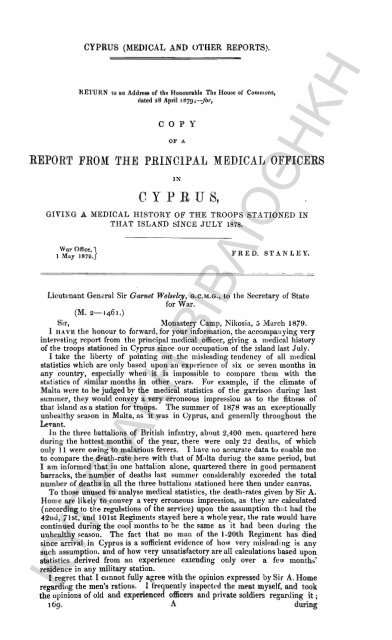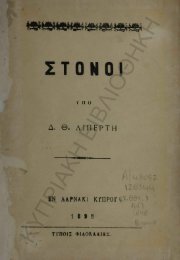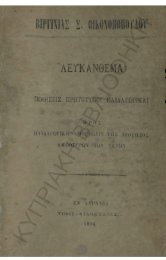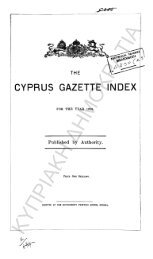You also want an ePaper? Increase the reach of your titles
YUMPU automatically turns print PDFs into web optimized ePapers that Google loves.
8 REPORT RELATING TO CYPRUS.land near the salt march, caused its comparative immunity.* On <strong>this</strong> beingsuggested, the companies of the 42nd, whose tents were on the lowest part ofthe slope, were moved to higher ground near the presumed healthier site of the71st fines. Owing to the change of arrangements soon after made, however,the effect which <strong>this</strong> me<strong>as</strong>ure might have had in averting sickness w<strong>as</strong> never<strong>as</strong>certained.The proceeding which, of all others, seemed to be demanded, w<strong>as</strong> that ofmoving the camp away from Chefiik P<strong>as</strong>ha altogether; but it w<strong>as</strong> not e<strong>as</strong>y todetermine where to move to. The choice of ground for a new camp w<strong>as</strong>restricted by the nece-sary conditions, that with an apparent absence ofmalarial soil, there must be a sufficient supply of good water, and a distancefrom the existing camp, not exceeding that which the small avaUable amount oftransport could manage. Inquiry from persons of local knowledge who werelikely to give responsible advice, resulted in the selection of Dali, in the valleyof that name, <strong>as</strong> a locality likely to prove healthy ; other places were suggestedby different persons, but Dali w<strong>as</strong> the only one in regard to which there w<strong>as</strong> anagreement of favourable opinion, or rather in respect of which no adverseopinion w<strong>as</strong> given.It had not been originally meant to make more than a very short stay inChefiik camp; most of the troops were to be placed at the different centres of thecivil government of the island, but the intention w<strong>as</strong> ultimately carried out <strong>as</strong>respected two of them only, Kyrenia on the north, and Papho on the westco<strong>as</strong>t. On the 19th of August the head-quarters of the 42nd Highlanders weresent by sea to Kyrenia, and next day two companies of the same regimentwere embarked for Papho. The men who A\ ere recovering from attacks of feveracquired at Chefiik were sent with their regiment, the belief being that removalfrom that place, and the invigorating effect of a short sea voyage, would restorethem to health.On the 28th of August the 71st Highlanders marched to DaU, 17 milesnorth-west of Chefiik P<strong>as</strong>ha; they were at first encamped in the valley on groundat the b<strong>as</strong>e of the cliff which forms its northern boundary or wall. The DaliValley presented a striking contr<strong>as</strong>t to the desert-like country adjoining theformer camp. The Idalia River, which runs through it, though a river only inthe se<strong>as</strong>on of heavy rains, and at other times the bed of a river in which thereare occ<strong>as</strong>ional pools, fertilises a narrow strip of land on each side of it by meansof a water system which h<strong>as</strong> been contrived by sinking a series of shafts intothe stratum beneath its bed, and connecting them by a gallery and culverts.The valley thus h<strong>as</strong> the appearance of the country bordering the River Nile •the most luxuriant field of cereals, of cotton, and of other crops, extend <strong>as</strong> far<strong>as</strong> the irrigation channels are carried ; bevond <strong>this</strong> point steriUty beginsabruptly. The population of the valley is aggregated in several smaU villagesof clay-built houses, the churches and mosques being commonly the onlybuildings which seem fit to withstand the effect of a heavy shower of rain • butnotwithstanding their appearance, they are soUdly bmlt and well designedfor the needs of those inhabiting them ; the heat of summer and the chiUinffwinds of winter are both excluded by the thick sun-burnt clay walls and bvroofs of mattmg, brushwood, and clav in successive layers. The structures inwhich the inhabitants secure cool dwellings for themselves could not howeverbe quickly erected for the troops. In the selection of a camp in which to placemen depressed by the occurrence of epidemic sickness, the effect on their spiritsof the sight of trees, of green fields, of vineyards, of houses, and the signs ofdomestic hfe and occupations, were of sensible importance; all ihesi wereobtained at Dah.As the 101st Regiment w<strong>as</strong> under orders to leave the command, and <strong>as</strong> troooswere required at Larnaca for duties in connection with the landing and protectionof the Government stores, three companies of the corps were movedsuccessively from Cheflik P<strong>as</strong>lia to a camp on ground close to the west side ofthe** In the communication from Fleet-Surceon Dr BMnmnnf o « „i. J Jis given of the fact that the existence of a verv circZrjJhl^' ^H^ *^r"'*** *^« ^'^ illustrationcomparative prevalence of sickness in two bodiero7meiXed^^^^^^^^ °* ma aria may determine theconditions. Of the detachment landed from H.M S " Minofaur "Thf .?P"'"'^y "^**f V^'i'^y ^^' ««^the F.aniaea Gate of Nikosia. and the Royal Marines th« ro?ipl'n^- u*""'", °«cupied the barrack overattacks of fever in the party of seamen we?e tZTvf^teoi'^Tifr.J!'.^ fVu*'^ ^^".*^« Fl?^" G**« J t^«of Royal Marines they were in the rate of 91 per cenT ^ * ^^ *^^ "^'*°^^' ^^"'' »" *^« P'^^yΚΥΠΡΙΑΚΗ ΒΙΒΛΙΟΘΗΚΗ
REPORT RELATING TO CYPRUS. 9the town. The military necessity which demanded the presence of the regimentat Larnaca, also dictated that the site of their camp should be in proximity tothe locality where the men had to undertake the duty.At first the effect of removal from Cheflik on the health of the men seemedto be beneficial in every instance. The 42nd especiaUy seemed to haveexchanged an unhealthy for a healthy camp. It h<strong>as</strong> been statefl in the introductionof <strong>this</strong> report that no exact information respecting the climate of Cyprusw<strong>as</strong> obtainable, the relative healthiness of the various places could only beguessed at, of)inion res|jecting <strong>this</strong> being formed not from carefully observedfacts, but mainly from the impressions of individuals, and of a very smaUnumber of individuals, of the effect of residence at the localities on their personalhealth, and <strong>this</strong> might obviously be extremely misleading. Places of notoriousunhealfhiness were known, but there w<strong>as</strong> no general consent of opinion <strong>as</strong> tothe healthiness of 8,nv particular place. In answer to the question. How w<strong>as</strong> thesalubrity of any district to be <strong>as</strong>certained, one gentleman, in every way exceedinglyweU qualified to advise, said, *' Go to tlie various villages, notice theappearance of the inhabitants ; where you find them well grown and robust, thatplace will be healthy." Writing after an experience of eight months, the adviceseems to be ihe very best that could have been given, but it required time to put it touse. Kyrenia w<strong>as</strong> very favourably spoken of; people convalescent from sicknesswent to it to h<strong>as</strong>ten their recovery; it w<strong>as</strong> thought that troops there might belodged, part in a small fort near the shore, the rest in an old convent on the sideof the mountain. When the 42nd arrived, however, it w<strong>as</strong> found that neitherof these buildings could be adapted to use, and the regiment w<strong>as</strong> again placedin a camp formed near the town of Kyrenia, about half a mile from the sea, anda mile from the foot of the mountain chain which separates the narrow northco<strong>as</strong>t district from the rest of the island. The situation of the camp w<strong>as</strong> open, .—trees for shade abounded, the site seemed dry, and water procured from an ^aqueduct close at hand w<strong>as</strong> plentiful, and of good quality. The remarks made ^by the medical officer in his first report, after the arrival of the 42nd at Kyrenia, ^were to the efiect that the health of the regiment had improved very much, that y>nearly all the convalescent men sent from Cheflik camp had returned to their Sduty, and that the c<strong>as</strong>es of fever admitted into hospital were few and of a mild "*"kind. In the next week, however, there w<strong>as</strong> a large incre<strong>as</strong>e in the number of 03men in hospital; part of <strong>this</strong> w<strong>as</strong> due to the exposure which a party of the ^regiment underwent when on duty escorting convicts ; the men were excessively ^fatigued in climbing the side of the mountain in the hot sun, and many of them Qsuffered from fever in consequence. The heat continued to be great; even in 0the comparatively good shelter of the Indian tents, in which the troops were "X.lodged, the thermometer registered 98°. Relapses of fever now became commonin those who had suffered at Cheflik. In the second week of September, 23 menwere attacked with remittent fever; eight of the c<strong>as</strong>es were relapses,, and a deathdue to the dise<strong>as</strong>e occurred, but most of the attacks at <strong>this</strong> time were of a lightkind, <strong>as</strong> is shown in the fact that the discharges from hospital in the week weremore in number than the admissions.A detachment of 40 men of the Royal Engineers w<strong>as</strong> also stationed atKyrenia, in a camp three miles from the town, near an old mon<strong>as</strong>tery on theside of a wooded mountain, at an elevation of about 600 feet above sea-level;but <strong>this</strong> proved to be no healthier than the lower ground in the plain where the42nd w<strong>as</strong> encamped.The post w<strong>as</strong> first occupied at the end of August, when nine men recoveringfrom fever were transferred to it from Nikosia. An outbuUding of the mon<strong>as</strong>teryat " Bella Pais," <strong>as</strong> the place w<strong>as</strong> named, had been fitted up <strong>as</strong> a field hospital,and it w<strong>as</strong> hoped that the greater coolness on the high ground, with the shadeof the trees, and the protection from the sun which the thick waUs gave,together with the inspiriting effect of change to a place of so much naturalbeauty, would justify the selection of the mon<strong>as</strong>tery hospital <strong>as</strong> a convalescentstation for the island. No tonic, bracing effect, due to residence at it howeverw<strong>as</strong> apparent; the sick recovered very slowly and imperfectly, whilst the menemployed on duty at the post were attacked with malarial fever in about thesame proportion <strong>as</strong> those in the lower camp.The companies of the 42nd sent to Papho suffered even more severely thanthose at Kyrenia. Though at first placed on low ground, the camp w<strong>as</strong> soonmoved to a higher and an apparently unobjectionable site close to good water,169. B butΚΥΠΡΙΑΚΗ ΒΙΒΛΙΟΘΗΚΗ5
10 REPORT RELATING TO CYPRUS.but a good deal of exposure had occurred at first to a part of the men beforethe camp w<strong>as</strong> set out, and the various arrangements necessary for their comfortwere made. The Indian tents were used. After the detachment had been afortnight at Papho, the admissions into hospital for remittent fever were in theannual rate of 4,216 per 1,000 of the strength, but the Ulnesses were mostlyof short duration. In the next week the rate w<strong>as</strong> more than doubled, and forthe week ending the 13th of September, 47 men were attacked in a strength of163, and one of the attacks w<strong>as</strong> fatal after an illness of two days. Althoughthe heat had now become sensibly less, and the weakliest of the men had beensent away, no abatement in the amount of sickness took place; in the l<strong>as</strong>tweek of September, 31 men were taken into hospital, one-half of vvhom hadpreviously suffered from fever. The men of the detachment looked exceedinglyill; even those at their duty, with exceptions which were quite rare, had nostrength for active or for any continued exertion.After being moved from Cheflik, the 101st Regiment had at first a shortinterval of comparative health at Lamaca. The fatigue duties devolving on themen in landing stores, &c., though carried on only in the morning, entailedexposure in a Run, powerful even then. In the second week after the arrivalof the regiment there w<strong>as</strong> a daily average of twenty-three admissions intohospital, and at the same time the discharges from hos(>ital averaged twelveonly; the peculiarity of the ilhiess, the recurrence of fever for an indefinitenumber of times in those once attacked, caused a constant succession of thesame individuals into hospital. Many of the illnesses at Larnaca were of greatseverity; in some of them death followed within a few days of the seizure.The sick from the camp were treated in a field hospital adjoining it, or <strong>as</strong>room became available in a hospital in the town. The heat, though moremoderate than at first, w<strong>as</strong> still very great. After the unsucceissful efforts madeat first to procure buildings for hospitals, the search, though not abandoned, w<strong>as</strong>not pressed, from experience of the unsatisfactory progress of the c<strong>as</strong>es of illnesstreated in that already estabUshed, and the hopelessness, with the means atcommand, of effecting any real abatement of the insanitary state of every buildingin the town; but it w<strong>as</strong> impossible not to recognise the fact that thechances for the recovery of a man in fever, with a temperature of body of105 degrees, were greater on the whole, in an unwholesome house in which theheat w<strong>as</strong> 85 degrees, than in a marquee.Two more dwelling-houses were therefore hired, and equipped <strong>as</strong> hospitals;by <strong>this</strong> the accommodation for the sick in buildings w<strong>as</strong> incre<strong>as</strong>ed to 65 beds.In the second and third weeks of September the attacks of fever oscillated, soto speak, in evident relation to perceptible atmospheric conditions. The se<strong>as</strong>onfor the light rains had arrived, and from time to time the expected showersseemed about to faU; in the early morning, before day, vivid lightning lit up thesouth-e<strong>as</strong>t horizon; the sun rose amongst heavy m<strong>as</strong>ses of black clouds, and acold wind, heavy with damp, blew in the morning and forenoon. But theseappearances did not prove to be the precursors of rain ; the sun burst throughthe clouds, and after a period of diminished intensity again shone with itsordinary power. The effect of <strong>this</strong> peculiar condition w<strong>as</strong> seen on the 9thof September, in the number of attacks of fever rising to 21, and next day to 26,whilst on the third day after the cessation of the atmospheric phenomena theattacks were only 16 ; on their repetition, however, on the 13th of September,the admissions into hospital for fever rose to 39. The same relation betweenan abnormal meteorological state, and an incre<strong>as</strong>e of sickness at <strong>this</strong> time, w<strong>as</strong>also felt in the ships of war anchored two miles from the shore. On the 'l8thof the month heavy rain at length feU, and an incre<strong>as</strong>e in the prevalence erffever followed ; but there w<strong>as</strong> no progressive incre<strong>as</strong>e, though there w<strong>as</strong> muchrain on three days subsequently. An effect of the great djffusion of malarialdise<strong>as</strong>e w<strong>as</strong> the repression of nearly every other kind of illness; thus, in themiddle of September, of 106 men in hospital, only three suffered from' iUnessother than malarial fever. A great change in the proportion in whidi the twoforms of fever occurred now took place ; the severe kind w<strong>as</strong> displaced by themilder; but <strong>this</strong> did not affect the total amount of Ulness, which remained verymuch tiie same <strong>as</strong> before. In the first week of September there were only threeadmissions for ague, whilst there were 20 for remittent fever; in the secondweek of October there were 25 admissions for ague, and only one for remittentfever. In the first three weeks of October the discharges from hospital atLarnacaΚΥΠΡΙΑΚΗ ΒΙΒΛΙΟΘΗΚΗ
12 REPORT RELATING TO CYPRUS.causation ot sickness had been introduced, and at the same time the old oneswere losing much of their former power, it w<strong>as</strong> not possible to decide whetherthe new ground w<strong>as</strong> more or less healthy than the old, or just <strong>as</strong> unhealthy.The se<strong>as</strong>on w<strong>as</strong> near when sickness might be expected to decre<strong>as</strong>e greatly, feverbeing repressed <strong>as</strong> soon <strong>as</strong> heavy and continuous rains have saturated the ground,and at the same time the sun in the intervals of dry weather h<strong>as</strong> not its formerpower. In the beginning of October the heat, though considerable, w<strong>as</strong> verysensibly less than before, the men ate better, and being bettei nourished, weremore able to withstand iUiiess; on the other hand, the labour of road-makingfor six hours a day under a stiU powerful sun, and in a locaUty where chillingbl<strong>as</strong>ts of cold wind blew down the valleys, excited attacks of fever in thosewhose systems tiie malarial poison w<strong>as</strong> present. The necessity for thusemploying the men, however, w<strong>as</strong> paramount to every other consideration;their employment at road-making w<strong>as</strong> the le<strong>as</strong>t of two evils; the possibility ofputting the troops under cover before the winter rains came on, depended *ontheir own exertions. No sufficient supply of labour could be had in thecountry, even after sweeping the neighbouring districts, and gathering in theold and the young of both sexes, and employing them in such capacities <strong>as</strong>their strength fitted them for. If a road fit to be used in winter, between theb<strong>as</strong>e from which the troops were fed and the place at which they were to bestationed, w<strong>as</strong> to be constructed, it must be done principally, or largely, bytheir own labour; the men Uked the work; were eager for it; they preferredanything to an objectless life in camp.In the l<strong>as</strong>t week of October sickness amongst the troops at Mathiati suddenlyfell to about the half of that previously present; though the decre<strong>as</strong>e w<strong>as</strong> in partsimilar to that which had followed the outbreaks in Cheflik and at Dali, andthough the diminished rate w<strong>as</strong> not maintained quite uninterruptedly, it markedthe turning-jjoint between the healthy and unhealthy se<strong>as</strong>on, between the excessiveand moderate prevalence of the endemic illness. The huts sent fromEngland for the housing of the troops had now arrived, and were in course ofconstruction at Mathiati, but the influence which the greater comfort theyafforded had in reducing sickness w<strong>as</strong> not evident until three weeks later, vvhennearly all the men were removed from the tents. After <strong>this</strong>, and the other accompanyingameliorations, the condition of the troops approximated to that ofthose at ordinary stations. Relapses of ague were the illnesses chiefly seen, butit sometimes happened that men who had p<strong>as</strong>sed through all the exposure andprivation of the preceding suninier without e.xperiencing sickness were nowattacked with fever, of a kind not distinguishable from that seen in the c<strong>as</strong>es atCheflik camp. The strongest evidence, however, of the change in the conditions,climatic and other, now affecting the troops, w<strong>as</strong> the fact that new comersat <strong>this</strong> time esca|)ed sickness nearly altogether.A party of 50 men of the Royal Engineers arrived from England in the endof October; after six weeks' residence only three of them had been attackedwith aiiue, and the same immunity w<strong>as</strong> seen in the instance of others arriving in<strong>this</strong> se<strong>as</strong>on.But whilst the health of the troops at Mathiati had improved so greatly, nocorresponding change took place in that of those at Kyrenia. Up to the end ofSeptember the men discharged from hospital very nearly balanced the numberof those admitted, but after that more were admitted than were discharged, andan accumulation of sick took place. One after another men, who up to thenhad V, ithstood the malarial poison, succumbed to its influence, and were attackedwith fever; but acute illnesses were now less dangerous; there w<strong>as</strong> not therapidly fatal termination seen in bad c<strong>as</strong>es in the hot se<strong>as</strong>on; the deaths werefewer. The only remedy for the sickness from which the troops at Kyreni<strong>as</strong>uffered w<strong>as</strong> removal to a locality free from malaria, but it could not be <strong>as</strong>certainedwhere that w<strong>as</strong> to be found, and the experience at Dali, and again atMathiati, seemed to show that a great aggravation of the prevalence of feverwould take place at once on the removal of the troops to any fresh ground inthe island. Many of the men who suffered from repeated recurrences of fever,and from the complications consequent on the state of chronic malarial illness,were invalided, and others, whose condition seemed less urgently to require invaUding,were occ<strong>as</strong>ionaUy sent, by the courtesy of the Admiral commanding thesquadron, to cruise at sea in a ship-of-war for a week or 10 days ; <strong>this</strong> me<strong>as</strong>ure,fromΚΥΠΡΙΑΚΗ ΒΙΒΛΙΟΘΗΚΗ
REPORT RELATING TO CYPRUS. 13from which great good w<strong>as</strong> expected, failed to effect much; some of those takenon board quickly regained strength, but the majority were unbenefited, and tosome the voyage w<strong>as</strong> injurious.In the second week of October huts were received at Kyrenia, and the troopswere employed in erecting them. At first the effect of work seemed to besalutary ; the men were interested, and sickness diminished a little; but the slightimprovement w<strong>as</strong> not long continued ; the proportion of sick (including men atlight duty, and those attending,hospital daily to take quinine) w<strong>as</strong> only fractionallyless than 20 per cent, of the strength, and at the same time many of theother four-fifths were very weak. None looked robust.At Papho also the men of the 42nd continued to be very sickly ; even afterthe invaliding of nearly one-fifth of those originally sent there, the "daily averageof sick amounted to a sixth of those left.In the beginning of November orders were given for the withdrawal of the42nd Highlanders from the command, and the regiment left on the 18th of themonth. On embarking, the sick were 100 in number, in addition to whom30 men were at light duty only, the two cl<strong>as</strong>ses together being in the proportionof 20-2 per 100 of the strength.During the lime the regiment w<strong>as</strong> stationed in Cyprus its average strengthw<strong>as</strong> 727 ; the attacks of illness amongst the men were 1,258, and the deaths 12 ;the rate of sickness w<strong>as</strong> in the annual proportion of 4264*4, and that of deathsin the annual rate of 40*68 per 1,000 of the strength ; 61 men were alsoinvalided.Nearly all the troops were now quartered at Mathiati, and were lodged inhuts of comparative comfort. Mathiati is a viUage in the lower range of hills,at the b<strong>as</strong>e of the mountain chain, which runs nearly through the island fromwest to e<strong>as</strong>t. Here at a height of 1,100 feet above the sea, a plain w<strong>as</strong> foundabout a mile long, and half a mile in average width, and surrounded by hills,some of which rise to nearly 200 feet above the level ground. Good watercould be procured from wells ; the heat in summer w<strong>as</strong> somewhat less than thaton the lower ground in the same valley. These advantages, and the occurrenceof much sickness on the first occupation of Dali, contributed to the selection ofMathiati <strong>as</strong> a provisional cantonment for the troops. In the autumn a roadfor wheeled carriages had been made through the valley, and huts of what iscalled the " Canadian pattern " had been brought up. The one advantageclaimed for <strong>this</strong> particular description of hut, is the rapidity with which thedifferent parts of it can be put together, and it w<strong>as</strong> thought that, in the specialcircumstances of the c<strong>as</strong>e, <strong>this</strong> outweighed other considerations; solid, goodhuts could not have been made, transported, and erected in the short time supposedto be available. The huts were single boarded, uncoiled, and without aprovision for warming; the sun penetrated through their roofs, and wind w<strong>as</strong>admitted through the numberless chinks iu the warped boards; but lioweverimperfect, they were imme<strong>as</strong>urably more comfortable dwellings than the tents inwhich the men had been so long encamped. The huts were erected on a ridgeat the north border of the plain. The hospital huts were of very good pattern,raised from the ground, lined, and ceiled ; they were roomy, and well designedfor the comfort of the sick.After the troops were settled in the cantonment, the weather w<strong>as</strong> <strong>as</strong> favourableto health <strong>as</strong> it had previously been unfavourable, and sickness graduallysub^ided. Ague continued to be the ordinary form of it met with, but therepression of every other kind of dise<strong>as</strong>e than malarial fever w<strong>as</strong> not so complete<strong>as</strong> before; in the beginning of December, however, two-thirds of the men inhospital still suffered from it. The proportion of sick at Mathiati at <strong>this</strong> timew<strong>as</strong> 8 per cent, of the strength ; in the middle of the month it w<strong>as</strong> 6 per cent.The men of the Royal Engineers participated in the improvement in health veryslowly; their sick rate in the second week of the month w<strong>as</strong> 14 per cent., and inthe l<strong>as</strong>t it w<strong>as</strong> 7i per cent.^On the 15th of December the 7 lst Highlanders left the command ; its sick rateon embarking w<strong>as</strong> a little over 5 per cent.During the time it served in Cyprus its average strength w<strong>as</strong> 724 ; there were1,083 attacks of illness amongst the men, and five deaths; the sick rate, reducedto an annual proportion, w<strong>as</strong> 3242*5, and the death rate 14-97 per 1,000 men.The regiment also sent 13 invalids home.169. B3 TheΚΥΠΡΙΑΚΗ ΒΙΒΛΙΟΘΗΚΗ
14 REPORT RELATING TO CYPRUS.The 71st w<strong>as</strong> relieved by the 1st Battalion of the 20th Foot from Halifax, onthe 12tb of December.On arrival the battaUon proceeded to Mathiati in two marches, and it h<strong>as</strong>been quartered at that cantonment up to the present time; its health h<strong>as</strong> beenexceUent, the average number of men in hospital having been only 3*3 per cent.;the iUnesses in nearly every instance were of a very light kind. Three mensuffered from ague, but no other form of climatic Ulness appeared amongst themen. Ihe winter proved to be exceedingly enjoyable; the days were brightand ple<strong>as</strong>antly warm, without being hot. Heavy rain fell occ<strong>as</strong>ionally, but itw<strong>as</strong> never long continued ; hoar frost and thin ice were often seen at Mathiatiin the early moming, and the air w<strong>as</strong> very keen on those days, when the windcame over the snow-covered heights of Mount Olympus, but there w<strong>as</strong> anabsence of damp cold : in consequence of <strong>this</strong> chest affections were rare, andall acute iUnesses were rapidly recovered from.Inquiry had from the first been made respecting a locality in Cyprus,residence at which, under the ordinary conditions of a soldier's life, mightbe compatible with the enjoyment of an average standard of health throughoutthe year. It w<strong>as</strong> probable that with the avoidance of the accidentalsources of unhealthiness to which the troojis were exposed in the first fivemonths of their residence in the island, those unavoidable might not begreat. The information obtainable related exclusively to the health ofcommunities in the plains, and it w<strong>as</strong> in harmony with that received atfirst, to the effect that fever w<strong>as</strong> found everywhere during the hot months;experience in the c<strong>as</strong>e of the troops showed that in those once attacked, recurrencesof fever would follow; to prevent the first attack, therefore, seemed to bethe problem. From the known repression of malaria by cold, and its decre<strong>as</strong>edprevalence nearly in proportion to incre<strong>as</strong>ed altitude in the countries subject toit, the inference w<strong>as</strong> that in a station at a sufficient height in the hills of thecentral range, the immunity sought would be obtained. In the district roundBeyrout, at 12 hours' sail from Cj^jrus, the same fever <strong>as</strong> that seen in the islandis endemic, but in the mountain which rises from the plain there it is unknown,except <strong>as</strong> occurring in persons who have removed from the low country torecover from its attacks. No reliable information concerning the health of theinhabitants of the hills in Cyprus w<strong>as</strong> procurable ; it w<strong>as</strong> believed that fever w<strong>as</strong>less met with in the hills, and w<strong>as</strong> milder than that seen in the plains, but<strong>this</strong> opinion did not rest on observation. It w<strong>as</strong> difficult to find anyonewho had ever niade the joumey to the hills, where there w<strong>as</strong> no town, or evenany considerable village; excepting a few monks, all the inhabitants werepe<strong>as</strong>ants exceedingly poor, and their ignorance may be inferred from the factthat the piiests were pe<strong>as</strong>ants also, un distinguishable from the rest by dress ormanners, and that very often they could neither read nor write. An investigationmade.in the course of a joumey undertaken in December, proved that aguew<strong>as</strong> met with each year from May to October in every village from Prodromes,the highest inhabited ground in the island, and just under the summit of MountOlympus, to the rillage at sea-level at the foot of the chain, but it also showedthat the dangerous kind of fevt r, that called the pernicious fever, w<strong>as</strong> not metwith amongst the inhabitants after a height of 3,600 feet w<strong>as</strong> reached. Theappearance of the people in the hills w<strong>as</strong> usually very good ; they were floridand robust.But though it w<strong>as</strong> <strong>as</strong>certained that malarial iUness might be met with evenin the hills, the significance of the fact taken by itself w<strong>as</strong> greatly reduced wheneverything connected with its occurrence w<strong>as</strong> considered. As a body, the populationof the hills looked healthy and vigorous; their appearance w<strong>as</strong> incompatiblewith the existence of a widely-diffused chronic sickness. In cultivatingfields in the lowest parts of deep and damp valley.=s, where the air w<strong>as</strong> infectedby decaying accumulations of vegetable matter, brought down by the torrentsin winter, individuals were exposed to the influences which develop ague. Asoldier in a cantonment in the hills, however, would not be exposed to thosehurtful influences; his employment, lodging, food, and clothing ought to bethose most favourable to health, and if on its first establishment ague w<strong>as</strong> notaltogether absent, the c<strong>as</strong>es of it would probably be mild, and <strong>as</strong> the drainageof the locality became more perfect, fewer in number, untU at length, <strong>as</strong>originating at the cantonment, the dise<strong>as</strong>e would be <strong>as</strong> little known <strong>as</strong> it is inEngland.ΚΥΠΡΙΑΚΗ ΒΙΒΛΙΟΘΗΚΗ
REPORT RELATING TO CYPRUS. 15England. Besides placing the troops at an elevation sufficient to insure a coolclimate in summer, the men intended for service should arrive in Cyprus atsome time between the middle of November and the middle of February ; theyshould be lodged suitably ; and until the resources of the island for the supplyof meat of good quality are much greater than at present, cattle fit for use in<strong>this</strong> way should be imported.It is believed that, under these e<strong>as</strong>ily satisfied conditions, troops might bestationed at a selected place in the hiUs in Cyprus, with every prospect of theirbeing healthy and efficient.A. D. Home, Surgeon General,Nikosia. I March 1879.Principal Medical Officer.ΚΥΠΡΙΑΚΗ ΒΙΒΛΙΟΘΗΚΗ169. B 4
too.I^ 2,00 I• os^^ ^ ^o— •51 2 'W•^ S^ 2 K!S H § ^• § =• WCD Nj oM soCD 0 H&.-» 3^§ "S. 3rt •< _.o- 5- 5-_. Q^ »tt w o•—I O•g- W ^.« t» o'^ H ii3 O Oo sa >rt> >< tHΚΥΠΡΙΑΚΗ ΒΙΒΛΙΟΘΗΚΗCyprus Library105820IwonawoS3H>tooHW
















